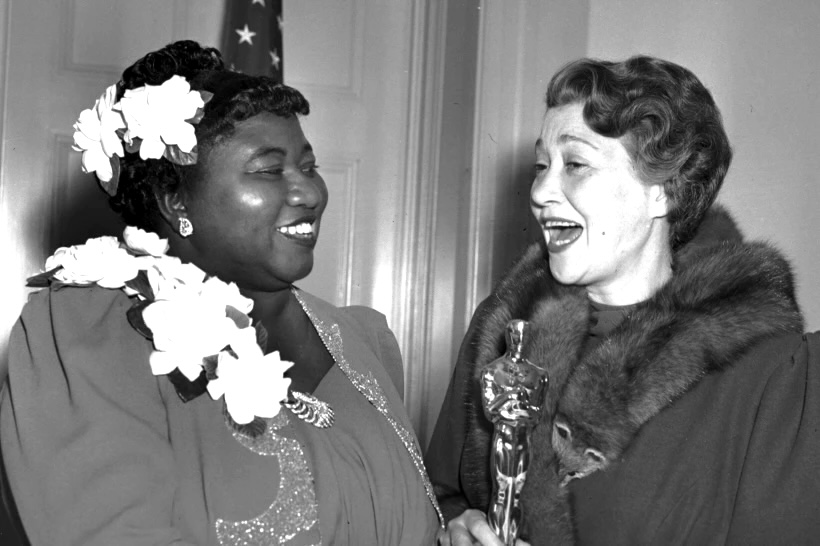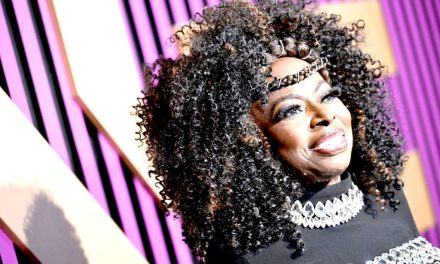By Helen Bezuneh
Special to the AFRO
At the Oscars ceremony in 1940, African-American actress Hattie McDaniel was seated at a segregated table on the far side of the room at the Ambassador Hotel. A great distance from the table where her fellow “Gone With the Wind” cast members sat together. The host hotel had a firm no-Blacks policy and David O. Selznick, producer of her featured film, had to make a special call to even let McDaniel enter the building.
Still, McDaniel sat poised in a turquoise gown adorned in sparkling rhinestones, her hair ornamented with white gardenias, when the announcer for the best supporting actress award approached the stage and finally revealed the winner: Hattie McDaniel. In one fell swoop, she officially became the first African American to win an Oscar for her role as “Mammy,” a house slave for a wealthy White family, in “Gone With the Wind.”
“Academy of Motion Picture Arts and Science, fellow members of the motion picture industry and honored guests, this is one of the happiest moments of my life,” a teary-eyed McDaniel said during her acceptance speech. “I sincerely hope I shall always be a credit to my race and to the motion picture industry. My heart is too full to tell you just how I feel.”
As a daughter to formerly enslaved parents, McDaniel had an intimate understanding of the hardships faced by African Americans at the time. For her, the Oscar was not merely a personal achievement –– she saw it as a significant victory for the Black American community as a whole.
Her role in “Gone With the Wind,” however, was not without controversy.
NAACP executive secretary Walter White and other civil rights leaders condemned McDaniel for taking on a role that reinforced stereotypes of African Americans as subservient and White-appeasing. McDaniel, however, held a different viewpoint, considering the inclusion of Black performers in major films a victory in itself.
“She ends up defending herself for taking that role, which many Black critics felt was disparaging – and it is,” Jill Watts, author of “Hattie McDaniel: Black Ambition, White Hollywood” told the AFRO. “But she defends herself not by saying ‘I read the book and turned the Mammy figure into this beautiful portrait.’ What she says is, ‘when I played it, I thought of people like Sojourner Truth, Harriet Tubman and my grandmother.’ She bases that role on the Black experience – at least that’s what she says.”
Though White held a different perspective, Watts argues that McDaniel was an activist in her own way.
“She was the one that had the most abhorrent racial slur that we can think of removed from the script,” said Watts. “She refused to say that. It was in the script until the day she shot that scene – then it was gone after she appeared in the scene. So you see her kind of really constrained, but you also see her behind the scenes pushing here and pushing there.”
Born in Kansas in 1893, McDaniel was the thirteenth child of her parents, her father being a Civil War veteran and her mother a domestic worker. The family eventually moved to Denver, Colo., where McDaniel was one of only two black students in her elementary school class.
McDaniel’s mother would bring her along to work in white homes, where the eventual Oscar winner would witness her mother toil for measly earnings. It was during these experiences that McDaniel realized that she wanted to carve out a different future for herself.
In high school, she started singing, dancing and performing skits with her siblings in minstrel shows. She would eventually get a role in a road tour of the musical Show Boat, jumpstarting her professional acting career.
According to Watts, McDaniel was a longshot for the role of Mammy in “Gone With the Wind.” Numerous Black actresses at the time, including Louise Beavers, vied for the coveted role, intensifying the competition.
“The dominant feeling was that Hattie McDaniel wasn’t serious enough to play that role,” said Watts. “There was a lot of resistance within the studio heads to cast her in that role because her performances were so bold. She’s so assertive in those roles and she makes those roles her own. She’s read by Hollywood as a comedic actress that you couldn’t possibly take seriously – a strong Black woman. If you think about that, ‘she’s too strong for the role’ is what they’re basically saying.”
With Selznick ultimately deciding to go with McDaniel, the actress suddenly had to face the difficult reality of navigating Hollywood’s motion picture industry. McDaniel, however, knew what to expect –– segregated dressing rooms, casual racism from the production team and cast and an overall rough time.
Though the multiple Black performers in the movie knew they could not do much about this reality, they came together to protest the studio’s segregated bathrooms and successfully got them desegregated.
McDaniel’s Oscar win was a momentous development in her personal life and the broader African American experience.
“It’s monumental because at the time, the Academy Awards had been going on for 11 years and no Black person had ever been nominated, yet alone won,” Reshonda Tate, writer, journalist and author of upcoming book “The Queen of Sugar Hill: A Novel of Hattie McDaniel,” told the AFRO. “Nor had any Black person been allowed in the ceremony.”
“She opened doors,” Tate continued. “Hattie McDaniel believed in fighting from the inside – she had a seat at the table. We’re used to those activists who are vocal, but she was a quiet activist who had a seat at the table and tried to make change that way while doing what she loved.”
Tate decided to write the novel after learning about McDaniel’s remarkable life –– however, as a child, even Tate experienced a distaste for the role of Mammy.
“My grandmother was a fan of ‘Gone With the Wind,’ and I remember the first time watching it, she loved it and I was mortified,” said Tate. “I was just disgusted with the character of Mammy. I didn’t like the way she overacted, I didn’t like the fact that she was a maid.”
“My grandmother asked why I was so disgusted, and I told her that,” she continued. “She said, ‘well, I’m a maid. Are you disgusted with me?’ And I said, ‘well, no.’ She went on to explain to me that Hattie McDaniel was playing the only role she was allowed. My grandmother said, ‘I get paid to be a maid, Hattie McDaniel gets paid to play a maid.’ It was then that I opened my eyes.”
Kevin John Goff, Hattie McDaniel’s great-grandnephew, spoke with the AFRO about the significance of McDaniel’s historic win and her life after the Oscar.
“She had seen a lot of heartache, a lot of death, a lot of discrimination, so she wasn’t operating on a level playing field, but she was courageous and hardworking. Her parents were hardworking, so she got that from them,” said Goff. “When she won the Oscar, I’m sure a lot of people were shocked, Black, White or whatever. She looked at it as a prideful thing, as an accomplishment, something that had never been done at that point.”
“She was hoping it was going to open up doors for her in huge ways, and it did a little bit, but her career didn’t go upward,” he continued. “But she knew that it would probably help other Black performers down the road, and that was her biggest hope.”
While McDaniel secured a role for “In This Our Life” shortly after her Oscar win, she found herself once again cast as a maid.
“In some ways it’s a classical Hollywood story,” said Watts. “There’s the Oscar curse where after you win the Oscar, it’s really hard to regain that momentum and continue some kind of climb in your career. You can imagine she’s dealing with that reality on top of being a Black woman in Hollywood.”
With McDaniel being able to make money on “Gone With the Wind” and command more pay for her future roles, she purchased a house in an area of Los Angeles called the West Adams district.
“She’s part of this movement of Black performers buying these really beautiful, old money mansions, and they’re integrating this neighborhood,” said Watts. “She does that and she faces pushback from the White residents who actually take her to court to try and push her out of her home because they want West Adams to remain White. She makes that fight against that residential segregation in Los Angeles.”
“In the end, the lawsuit that she fights is decided in her favor, and that sets a precedent for a Supreme Court decision later on to outlaw restricted covenants in residential segregation in the United States,” she continued. “Nobody gives her credit for that.”
As time carries McDaniel into the pages of history, Goff is working hard to ensure that people remember his distinguished great-grandaunt.
“My father, who Hattie used to babysit, this was originally his journey,” Goff told the AFRO. “When I got off the plane when I decided to move back to California, I believe I was around 23-years-old, the first thing my father said to me was, ‘do you want to have the responsibility of carrying on the family legacy one day?’ And I said absolutely. When he passed away in 2012, that’s when I knew I was going to honor that question that he asked me years before about taking on that responsibility.”
Goff is currently working on his book “Hattie McDaniel: A Reflective Life,” which will explore McDaniel’s personal experiences.
“Some people know some of the parts of her story and her life, but they don’t really know her as a woman, as a person,” said Goff. “The object of the book is to show more of the human side away from the screen, her thoughts, what she thought about life, what she thought about Hollywood. In some of her quotes you can see where her mind is.”
“Then I share some of my perspectives on her and the family – photos and different things of that nature,” he continued. “I share things that are still happening today and have been happening for the past few years because her talent was so huge, although she didn’t get to use it to its fullest. It’s an added layer to show, look, this was a real person, she had feelings, she had thoughts, she had her moral ground, she had compassion and those kinds of things. I want to paint a wider picture of her.”
With her upcoming novel, Tate also hopes to illuminate the commonly misunderstood parts of McDaniel’s life –– especially considering the attack on “Gone With the Wind” in 2020, when HBO Max temporarily removed the film from its streaming service after receiving complaints of its racial stereotypes.
“That was disheartening to me because her legacy was that she hoped to always be a credit to her race,” said Tate. “Part of what I’m doing with this book is I’m hoping to shed a new light on Hattie McDaniel to see that she was indeed a credit to our race. There are so many other areas that she made a difference in that people don’t even know about. I’m excited to bring those to the forefront as well.”
As of this year, only ten Black women have secured an Oscar, with nine of them triumphing in the best supporting actress category, and Halle Berry standing as the sole Black woman to have ever won the best actress accolade.
“In light of the Oscar nominations that recently came out, I’m excited for Danielle Brooks and Da’Vine Joy, who happen to be nominated in the same category,” said Tate. “But at the same time, it is sad that here we are, ninety-plus years later after the first Academy Awards, and we’re only at nine Black women who have won Best Supporting Actress. That tells you that while we have made some progress, there is so much more progress that needs to be made.”
The post Hattie McDaniel: Trailblazing as the first Black Oscar winner appeared first on AFRO American Newspapers.











